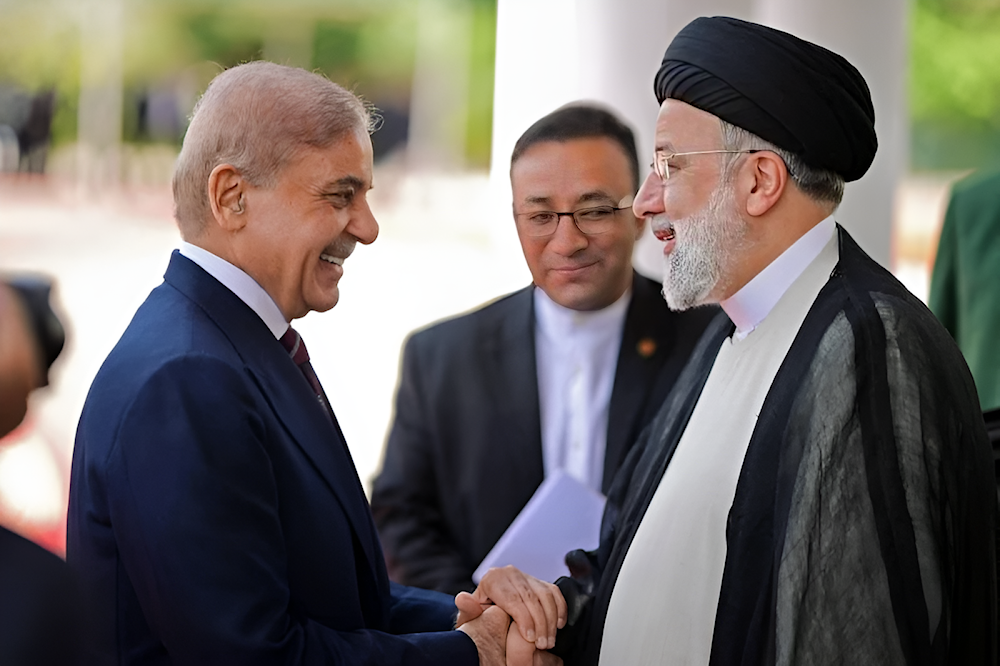Iran, Pakistan condemn Israeli 'atrocities' in Gaza, demand ceasefire
The presidents of Iran and Pakistan affirm plans to improve and grow economic and security ties.
-

This handout photograph taken and released by the Pakistan Prime Minister's Office on April 22, 2024 shows Iran’s President Ebrahim Raisi (R) being greeted by Pakistan's Prime Minister Shehbaz Sharif upon his arrival in Islamabad. (AFP)
Iranian President Ebrahim Raisi and his Pakistani PM Muhammad Shehbaz Sharif expressed their strong and "unequivocal condemnation" of the ongoing Israeli aggression on Gaza, which has crossed its 200-day mark, leaving over 34,000 Palestinian martyrs and more than 70,000 wounded.
In a joint statement during Raisi's trip to the neighboring country, both leaders denounced the Israeli occupation's "atrocities against the Palestinian people, along with the inhumane blockade of Gaza that has resulted in widespread death and destruction as well as displacement of millions of Palestinians."
They called for an immediate and unconditional ceasefire in the Strip, "unimpeded humanitarian access" to the besieged people of Gaza, the return of the displaced Palestinians, "as well as ensuring accountability for the crimes" being committed by the occupation.
The statement also reiterated both countries' support "for a just, comprehensive, and durable solution based on the aspirations of the people of Palestine."
UNSC must prevent Israeli adventurism
Both sides strongly condemned the Israeli attack on the Iranian consulate as "an unacceptable violation of the sovereignty of Syria and undermined its stability and security." They also agreed that the attack was a violation of international law and the UN Charter, and illegal under the Vienna Convention on Diplomatic Relations of 1961.
Read more: Iran has right to self-defense against 'Israel', Pakistan says
Raisi and Sharif called on the UNSC to "prevent the Israeli regime from its adventurism in the region and its illegal acts" of attacking its regional countries and "targeting foreign diplomatic facilities."
Both also agreed to enhance mutual interaction through the regular exchange of high-level visits to strengthen fraternal relations.
"They reviewed the entire spectrum of Pakistan-Iran bilateral relations and also exchanged views on regional and global issues of mutual concern," the statement said.
Border of peace and friendship
In February, Iran launched strikes against a separatist group on Pakistani soil, stating that it would engage any party that undermines its national security. Relations between the neighbors saw limited tensions after Islamabad declared that the attack was a breach of its sovereignty. Shortly after, the same separatist group located on Iranian soil was targeted by Pakistan. Subsequently, the two countries agreed to coordinate and collaborate to end the mutual threat.
The matter was discussed during Raisi's visit, as the president was heading a senior delegation of officials and private sector investors.
According to the released statements, both leaders acknowledged that "the Pakistan-Iran common border should be the ‘border of peace and friendship’," while both sides reiterated the "importance of forging regular cooperation and exchange of views between political, military and security officials.
"Highlighting the historical, cultural, religious, and civilizational ties between the two neighboring and Muslim countries, the two sides reiterated their commitment and dedication to further strengthening these bonds through the promotion of academic, cultural, and tourism activities, and by enhancing tourism to historic religious sites in both countries," it continued.
Sovereign energy partners
The United States has launched a hostile campaign targeting Pakistan over its growing relationship with the Islamic Republic. The main US concern was gas deals between the two countries.
In 2013, the US threatened Pakistan with economic sanctions over an Iran-Pakistan gas project dubbed the "Peace Pipeline" – an 80-kilometer pipeline from its border with Iran to the southwestern port city of Gwadar – citing concerns about Iran's nuclear program. The threats were renewed last month after Pakistan and Iran announced efforts to move forward with the project.
On Tuesday, Washington warned Islamabad of the "potential risk of sanctions" over its relationship with Tehran, adding that it will continue to take actions against proliferation networks considering business deals with Iran.
However, Pakistan has repeatedly declared that its relations with Iran are a sovereign matter that will not be influenced by foreign pressure.
According to the statement released by Pakistan's Foreign Ministry, a number of MoUs and agreements were signed during the visit.
Raisi and Sharif reiterated the importance of "cooperation in the energy domain, including trade in electricity, power transmission lines, and IP Gas Pipeline Project."
They agreed to further expand trade and economic cooperation and affirmed their commitment to transforming their common "border from ‘border of peace’ to a ‘border of prosperity’ through joint development-oriented economic projects," including setting up of joint border markets, economic free zones, and new border openings, and to boost their bilateral trade to $10 billion over the next five years.
Additionally, Raisi and Sharif expressed firm resolve to enhance cooperation in the connectivity, infrastructure development, and energy sectors as members of the Belt and Road Initiative (BRI) and the Economic Cooperation Organization (ECO).
Read more: Iran, Pakistan say colonial powers sabotaging bilateral ties
The statement revealed a mutual recognition that the Shanghai Cooperation Organization (SCO) was an important forum for regional security and development, "Both sides expressed satisfaction at close and cooperative relations between the two countries in all mechanisms of SCO."
Raisi extended cordial invitations to the President and the Prime Minister of Pakistan to pay official visits to Iran.

 5 Min Read
5 Min Read








